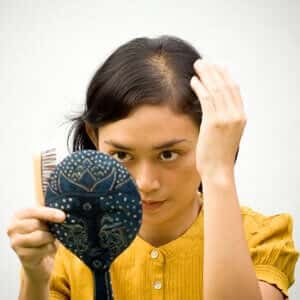
No one welcomes hair thinning, even if they may not be surprised by a receding hairline just like Uncle Charlie’s. Women often wear their hair longer than men do and may rely upon it more heavily to express their personal sense of style. Perhaps that is why so many women are disturbed to find that they are losing hair after menopause. One preliminary study suggests that a natural product might help restore hair growth.
Postmenopausal Hair Thinning Is Deeply Upsetting:
Q. I’m a woman in my early 60s and my hair has been thinning for 10 years. Rogaine and several other products I have tried were no help. My hair is thinner than ever.
I’m so very upset about my hair that at times I cry. Before menopause, I had a full head of thick brown hair. Can you recommend some home remedies for me?
A. We don’t know of any home remedies that can reverse hair thinning. On the other hand, a recent study suggests that you might want to try Pycnogenol, an extract of the French maritime pine. Sixty-three women with an average age of 54 participated in a placebo-controlled trial of this supplement (Health Science Reports, Jan. 2023). Those taking Pycnogenol had 30 percent more hair after two months and 23 percent more at six months. In addition, their scalps appeared to have better circulation than the women taking placebo. No unpleasant side effects appeared.
Pycnogenol is better known for its ability to ease menopausal symptoms (Journal of Reproductive Medicine, Jan-Feb. 2013). We wish there were bigger, better studies of this intriguing natural product.
Will Pycnogenol Reverse Hair Thinning?
Q. I think I’ve read in your column that Pycnogenol could help hair loss. Is there any truth to that?
A. Pycnogenol® is an extract derived from French maritime pine bark. A few studies have found it helpful in easing menopausal symptoms, especially hot flashes and night sweats.
Some readers have written to us that their hair and nails seem healthier when they take Pycnogenol. Now scientists have confirmed improved hair density in menopausal women taking this compound (see reference above). This placebo-controlled study was relatively small, though, and lasted only six months. Consequently, we welcome more research on this.
The investigators conclude cautiously,
“Oral intake of Pycnogenol® might have the potential to reduce hair loss in postmenopausal women.”
Does Dandruff Contribute to Hair Loss?
Q. Every time I shower there is more hair around the drain. I used to have nice, thick hair but it is thinning rapidly and I would like to do something to slow or stop my hair loss. Is dandruff a contributing factor?
I also wonder if some of my medicines are making my hair loss worse. I take a drug called lovastatin to lower my cholesterol and atenolol for blood pressure. Are there any natural remedies that might reverse hair loss?
Medicines That May Cause Hair Thinning:
A. Dandruff does not cause hair loss, but many medications can lead to thinning. Both lovastatin (Mevacor) and atenolol (Tenormin) may cause hair loss in some people. It often comes as a surprise to patients to learn that many medications can actually cause hair thinning or hair loss.
This is not something that is frequently mentioned when a doctor writes a new prescription. Pharmacists may not discuss it either when they dispense a blood pressure pill or a medicine to lower cholesterol. That said, there are literally dozens and dozens of drugs that cause “alopecia,” doctorspeak for hair loss. Here is a link to our Guide to Hair and Nail Care. It has a list of common medications that can contribute to this problem.
Natural Approach to Hair Loss:
There are a number of ways to combat hair loss including drugs such as Rogaine and Propecia. Scottish dermatologists demonstrated long ago that a mixture of essential oils (thyme, lavender, rosemary and cedar) can also be effective in counteracting patchy baldness known as alopecia areata. To learn more about this approach, here is an article we wrote about this ancient Scottish remedy: “Aromatherapy for Hair Loss.”
We are disappointed that this approach has not been studied further over the past two decades (Journal of Clinical and Aesthetic Dermatology, Aug. 2020). As with Pycnogenol (discussed above), randomized clinical trials could show whether natural products like essential oils have value against hair thinning.
Learn More:
Although dandruff does not directly lead to hair loss, it can be aggravating. Our Guide to Hair and Nail Care offers some suggestions for dealing with dandruff. It also provides an overview of Rogaine and Propecia. You may also wish to listen to our interview with dermatologist Crystal Aguh. It is Show 1223: How to Care for Summer-Stressed Skin. Also of interest: Show 1319: How to Have Healthy Hair and Nails, with Dr. Chris Adigun and Dr. Warren Heymann, and Show 1181: How to Keep Your Hair from Falling Out, with Dr. Adigun.
Citations
- Cai C et al, "An oral French maritime pine bark extract improves hair density in menopausal women: A randomized, placebo‐controlled, double blind intervention study." Health Science Reports, Jan. 2023. doi: 10.1002/hsr2.1045
- Kohama T & Negami M, "Effect of low-dose French maritime pine bark extract on climacteric syndrome in 170 perimenopausal women: a randomized, double-blind, placebo-controlled trial." Journal of Reproductive Medicine, Jan-Feb. 2013.
- Ezekwe N et al, "The use of natural ingredients in the treatment of alopecias with an emphasis on central centrifugal cicatricial alopecia: A systematic review." Journal of Clinical and Aesthetic Dermatology, Aug. 2020.

